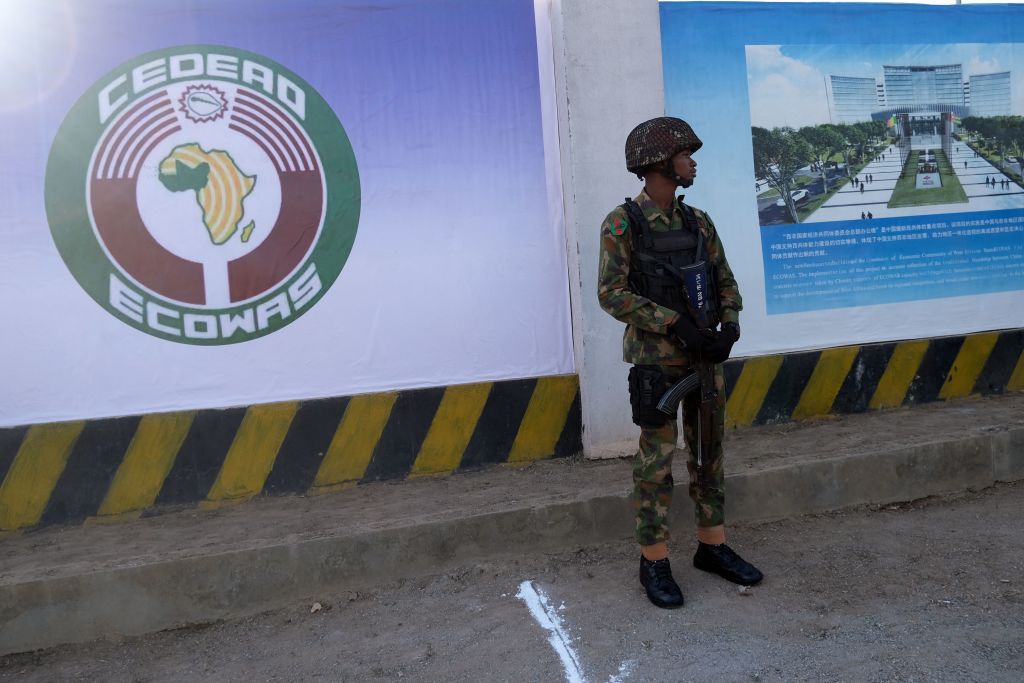ADF STAFF
When he opened a recent meeting of the regional bloc he chairs, Guinea-Bissau President Umaro Sissoco Embaló urged a new response to West Africa’s rash of coups.
He was speaking from experience, having escaped a failed coup that left 11 people dead on February 1, 2022.
At its annual summit in Abuja, Nigeria, on December 4, 2022, leaders from the Economic Community of West African States (ECOWAS) decided to establish a new regional peacekeeping force to help restore democracy and civilian rule in cases of coups.
“There is an urgent need to stem the waves of unconstitutional changes to democratically elected governments in West Africa while addressing holistically the root causes of agitation and unrest,” Embaló said.
The proposed ECOWAS force also would be tasked with countering the region’s violent extremist organizations, such as al-Qaida-linked Jama’a Nusrat ul-Islam wa al-Muslimin (JNIM) and Islamic State in the Greater Sahara (ISGS). Extremist groups are determined to spread from the Sahel into coastal countries such as Benin, Togo and Ghana.
Abuja-based political analyst Rotimi Olawale said that although the new ECOWAS force would be a welcome development, restoring peace and order will not be easy.
“What I see [that] might pose a challenge is this peacekeeping force is expected to respond to two twin challenges,” he told Voice of America. “There were cases where the sitting governments in some of these countries thwarted their constitutions to extend time of office of incumbent.
“Public opinions in some of the countries support use of force to have a fresh start.”
Olawale sees danger for the proposed regional force in cases of popular uprisings.
“I feel ECOWAS needs to be very careful in how it responds to coups,” he said. “There will be a lot of problems if there’s no public buy-in, especially among the citizens of the countries.”
ECOWAS has not offered details on the force, such as how it would be constituted or funded.
The region’s defense ministers are set to meet in January to consider the force’s structure. Omar Alieu Touray of The Gambia, president of the ECOWAS Commission, said the ministers are expected to flesh out a plan for the force in the second half of 2023.
Touray said the funding mechanism could not depend solely on voluntary contributions.
ECOWAS already has a standby force based in Abuja. There also are several ECOWAS peace support operations, including two currently in The Gambia and Guinea-Bissau.
ECOWAS has a history of supporting such missions.
Just days after the February 2022 attempted coup in Guinea-Bissau, ECOWAS leaders decided to send a stabilization force.
At the time, Ghanaian President Nana Akufo Addo issued a strong warning and used the word “contagion” to describe the region’s epidemic of coups.
“The resurgence of coups d’etat in our region is a matter of grave concern,” he said during an emergency summit called to discuss the issue in February 2022.
“This evolution challenges the democratic way of life we have chosen. Let us address this dangerous trend collectively and decisively before it devastates the whole region.”
Political science professor and author Emmanuel Balogun said ECOWAS must be patient and involve other peace and security stakeholders, including civil society groups.
“The unique thing about African regional organizations, and ECOWAS in particular, is that they operate in one of the only regions in the world to set up mechanisms to facilitate democracy and good governance — and facilitate a regional response to things like coups,” he told The Washington Post.
“I wonder how this latest effort will differ from what already exists, and why at this juncture there’s a need to create a new force, rather than using the standby force or other existing mechanisms.”
The West African heads of state, however, are clear on the need to reinforce constitutional order.
“To become president there’s a process, and it’s the people who decide,” Embaló said during a briefing in July 2022. “It’s not done through a military takeover.”

